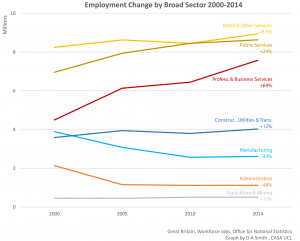The Big Question on… infrastructure
By ucyow3c, on 28 April 2015
Would devolution overcome uneven city investment?
Uneven growth, devolution and urban futures research
The financial crises and recession that began in 2008 were initially viewed as an opportunity for rebalancing the UK economy away from financial services towards a broader base, and addressing Britain’s long term north-south divide. The reality of recent years have instead seen a strengthening of regional divisions with high rates of growth in London and the South East, compared to mixed or negative performance in the rest of Britain. While the South East now needs to tackle the knock-on effects of growth in terms of the severe housing shortage, many regions in the UK have struggled to achieve growth.
The 2015 general election is unique for the prominence of city devolution policies by all the major parties. The Conservatives have over the last year been devolving some powers and budgets on and ad-hoc basis to northern cities, while Labour and the Lib Dems propose more comprehensive devolution in their manifesto commitments. These policies are aimed at boosting growth in northern cities and thus narrowing regional disparities.
Are these devolution policies likely to work? There is currently much debate and uncertainty over this question. I argue here that urban research at UCL and beyond can help us understand current trends in cities and where urban futures are likely to take us.
Economic growth is being led by professional and business service jobs, so-called ‘knowledge economy’ sectors. The economic picture illustrated above is one that significantly favours cities and city-regions. An expanding academic literature describes how larger cities are on average more innovative, competitive, diverse and sustainable, backed up with empirical evidence mostly from the USA. This line of reasoning matches the strong performance of the London, and also explains how the capital has been able to bounce back from the recession through its diverse economic base.
Yet in our research at the Centre for Advanced Spatial Analysis (CASA) we have found that the relationship between city size and economic performance does not hold for Great Britain (see paper). Several small cities are the fastest growing in the country and have become highly specialised in knowledge economy industries, principally cities/towns in the South East with universities such as Milton Keynes, Cambridge and Brighton. Meanwhile the major post-industrial cities, such as Birmingham, Manchester, Liverpool, Leeds and Newcastle are underperforming.
Are these northern cities capable of faster growth and developing stronger knowledge economy clusters? Recent regeneration in cities such as Manchester would suggest that they are, and indeed some green shoots can be seen around Manchester and Birmingham in the map above. Such regeneration does however require significant investment, planning and political collaboration. Thus this is where devolution comes in. The intention is to give cities more powers for strategic planning, housing, transport and local budgets. More comprehensive devolution proposals allow cities to retain money raised by local taxation. At present the city with by far the most devolved powers is London, with the creation of the mayor and Greater London Authority having positive impacts on planning and helping attract infrastructure spending towards the capital (there is currently a huge bias towards London). Would devolution allow other large cities to repeat London’s success, or could fiscal devolution further favour rich cities and exacerbate divisions?
Many of these issues around the future of UK cities are being discussed by the Foresight Future of Cities project which UCL is significantly involved in. You can read current Foresight working papers here.
Duncan Smith, UCL Centre for Advanced Spatial Analysis
UCL’s Big Questions sought contributions from academics around UCL to address the ‘big question’ facing the next UK government, and how research can provide an evidence base. It was devised by Clio Heslop (UCL Department of Science, Technology, Engineering and Public Policy) and Olivia Stevenson (UCL Public Policy), with the support of the Communications and Marketing team.
Have your say on the big questions by tweeting using #UCLGE2015, by leaving a blog comment, or by contacting the organisers.
Please join us on 27 May for the UCL’s Big Question Time event.
 Close
Close



